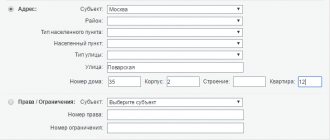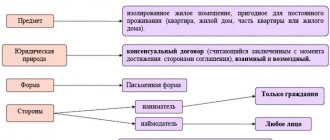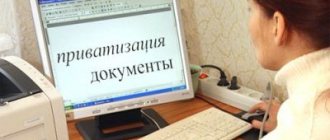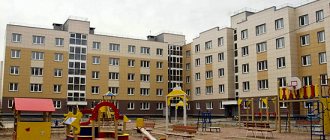Image from datarealty.ru
We are sure that you have come across such a concept as privatization more than once. Most likely you know approximately its definition and essence. In this article we will present instructions that will help you understand the features of the procedure, and in simple words we will tell you what privatization is and why it is needed.
Privatization. What it is?
The majority of Russian citizens live in houses rented from the state or municipal authorities under a social tenancy agreement. It has been twenty-five years since such housing can be privatized and become its owner.
Privatization is a free procedure for the legal transfer of state property into the ownership of citizens, leased under the right of social tenancy.
In simple words, we can say that this is a legal opportunity to take possession of a house or apartment that you rent from the state free of charge.
In Russia, this process started back in 1991, after the collapse of the USSR. Persons who received apartments from various Soviet enterprises were able to register them as their own.
Reason two: increase in property taxes
From 2014, Russia will gradually begin to introduce a unified real estate tax. The rate will be calculated taking into account the recently completed cadastral valuation. This means that owners will now have to pay a percentage of the real market value of the property. The new system will inevitably lead to higher taxes.
This will have a particularly strong impact on large cities, where housing prices are quite high. An exception will be those citizens who own real estate with an area of no more than 20 square meters. This means that if you do not plan to donate or sell your home, it may be more profitable to refuse privatization of the apartment.
The question is unclear, since it is impossible to buy a non-privatized apartment. That is, if you bought it, it means it has already been privatized. Most likely, you purchased an apartment for other reasons that are not a purchase and sale agreement. In this case, you can privatize it.
What needs to be done after concluding a purchase and sale agreement?
Documents when buying an apartment: see, sign, receive
Features of the procedure
The law regulating privatization assumes that it is free. The only costs will be to purchase documentary forms and pay for notary services.
At present, the main provisions of the legislation approved in 1992 remain relevant. The registration process has not changed, the only thing that should be taken into account is the time period within which you need to meet if you want to get your own property. Let us take a closer look at the period of time for which the state established privatization.
Image from finiq.ru
Terms of registration of privatization
As we have already said, after the collapse of the country of Soviets, Russia adopted a law on the possibility of obtaining rented housing in one’s own possession. The initial deadlines calculated for the registration procedure lasted until 2007. But subsequently this period of time was extended several times. In accordance with the latest decree of the President of our country, citizens have the right to receive personal property free of charge until March 1, 2021.
If you look at the history of the institution of privatization in our country, it is difficult to say that this date may become final or the deadlines will be extended for another year. There are many discussions on this topic. But one thing is for sure. The duration of the process depends on how long the legislative bodies will be loyal to the citizens.
❌ Which apartments are not subject to privatization
There are several categories of housing that cannot be privatized:
- official;
- in closed military camps;
- emergency premises or housing for demolition;
- apartment-museums.
Difficulties may arise with housing in which major redevelopment has been carried out without obtaining permits from the relevant authorities.
After completion of the privatization process, the owner can dispose of the housing at his own discretion: sell it, transfer it by inheritance. The only difficulty that may arise is several participants in the process with whom everything needs to be coordinated.
Who is eligible to receive housing?
First of all, these are people registered in an apartment leased from the state under a social tenancy agreement. There are individual cases when relatives or persons entitled to this type of registration are involved in this process.
If several people are registered on the territory of the house, then any of them may refuse to take part in the process. He will not be deprived of the right to live in such housing. Citizens can receive property into personal ownership only once.
Municipal executive authorities deal with issues of property registration. You can contact them if you want to get your own home.
Is it possible to privatize part of the apartment?
Privatization of shares in municipal apartments is also available to everyone. Privatization of rooms is possible for publicly owned communal apartments. At the same time, there is no need to obtain the consent of everyone who occupies the same area. The entire procedure is carried out independently, by the future owner.
The procedure is identical to that described above. And the rules that apply to ordinary apartments, which have some features that are recommended to be dealt with in advance.
- The main difference lies in the premises for personal use.
- They are registered as common property. This means that each of the neighbors belongs to the same extent.
- When calculating the area, the results must be certified by an employee of the bodies representing the executive branch. Only in this case will they acquire legal force.
- Any controversial issues in connection with such objects are resolved only in court.
Who can't privatize an apartment?
How long does it take to complete privatization?
Free privatization remains valid for one year. If future owners do not meet this deadline to complete all documents, then they pay additional amounts per square meters.
How to rent an apartment correctly so that there are no problems in the future, you will learn here.
How long the procedure takes depends on how quickly the necessary documents are completed. Some spend several months on this process. If no problems arise, the time is about three months. If there is a need for litigation, the procedure is delayed for six months or more.
What are the advantages and disadvantages of this procedure?
For some there will be more shortcomings, but they can also be easily corrected if necessary.
- Timing of privatization. As already mentioned, the procedure can take a long time.
- Inability to fully manage housing for which a social tenancy agreement has been drawn up.
- The need to pay property taxes. The rate is determined by regional authorities, and largely depends on the final cost of housing.
- After all the documents are completed, utilities are paid, the prices of which are increasing all the time. Owners also pay more for residential renovations.
What documents are needed for privatization, see this video:
But there are also advantages that seem to many to be more significant.
- Freedom of action in the case of registration and discharge of residents. The owner can register any people he wishes, as long as this does not violate legal requirements.
- It is almost impossible to evict the owner from such an apartment.
- Availability of the right to conduct any legally important transactions with living space. Including sales and rentals.
- Low cost of the procedure. You just need to pay for all the paperwork.
Activities of the bodies of the privatization institute
Image from verciasamara.ru
The law regulating the privatization process obliges officials to perform the following powers:
- Receive citizens with questions about the privatization of housing rented under the right of social tenancy.
- Issue documents required for registration.
- Provide consultations on the procedure for obtaining an apartment in personal possession.
- Send requests to the relevant housing and communal services structures.
- Register documents in the internal register.
- Accept applications and documents, compare them with evidence received from the BTI and other authorities.
- Draw up an agreement on the transfer of state property into the ownership of citizens.
- Conduct a quality check of documentation for errors in filling out.
- Transfer the package of documents received from citizens to Rosreestr.
Special cases...
FEATURES OF PRIVATIZATION WITH THE PARTICIPATION OF CHILDREN. If minors are registered and living in the apartment, they must receive a share in the right to the apartment. Children can be deprived of the opportunity to participate in privatization only with the permission of the guardianship and trusteeship authorities. However, they will give consent only if the child is given ownership of another housing - no worse than this apartment and no smaller area.
If only minors live in the apartment, privatization is possible only with the participation of guardianship and trusteeship authorities.
If the child is not yet 14 years old, the apartment can be transferred to his ownership at the request of parents, adoptive parents or guardians with the prior permission of the guardianship and trusteeship authorities or on the initiative of these authorities.
If a minor aged 14 to 18 years lives in the apartment, he must write a statement himself with the consent of his parents, adoptive parents or trustees, as well as the guardianship and trusteeship authorities.
FEATURES OF SHARE OR JOINT PRIVATIZATION. Joint privatization existed until May 31, 2001. Although this method of transferring housing is not currently used, some apartments privatized before this date are still in joint ownership.
As a result, a clarification was made to the privatization law that in the event of the death of one of the participants in joint ownership of an apartment privatized before May 31, 2001, the shares of the participants in common ownership of the apartment are determined, including the share of the deceased. The shares are considered equal.
Art. 3.1 of the Law of the Russian Federation of July 4, 1991 No. 1541-1
If several people are registered and living in the apartment and they all want to participate in privatization, the apartment will be transferred to them as common shared ownership.
Each of them will have to sign a corresponding statement, and then an agreement. In this case, the agreement on the transfer of ownership of the apartment will be drawn up in as many copies as there are people participating in the privatization.
Please note that adult citizens can participate in privatization only once. Therefore, if in the future you have the opportunity to privatize another property in its entirety or in a larger share, it may be worth refusing to participate in the privatization of an apartment for the whole family.
FEATURES OF MILITARY PRIVATIZATION. It is impossible to privatize an apartment located in a closed military camp. However, military personnel often have problems with the privatization of apartments located in ordinary populated areas. This is due to the fact that the Ministry of Defense does not always transfer houses from its balance sheet to the municipal one in a timely manner. Therefore, military personnel are forced to resolve the issue of privatization of housing in court.
Art. 4 of the Law of the Russian Federation of July 4, 1991 No. 1541-1
As a rule, the courts meet them halfway and satisfy such demands.
FOR EXAMPLE, in Samara the court satisfied the request of a serviceman to recognize the ownership of an apartment for him and his family. Prior to this, the Property Management Department refused to prepare documents for privatization for the serviceman, since the residential premises were not included in the municipal property register. The court recognized the right of common shared ownership of the apartment for the plaintiff and his family.
PRIVATIZATION if there is a debt on utility bills. Debt on utility bills does not prevent the privatization of an apartment. However, passport officers in HOAs or management companies often exceed their authority and refuse to issue an extract from the personal account, which must be attached to the package of documents, while there is a debt.
In this case, you can either pay off the debt or, through the court, oblige the HOA to issue the document.
Privatized apartment during divorce. If the apartment was privatized for both spouses, after the divorce each will have their share. If the apartment was jointly owned, after the divorce each spouse will be allocated a share. If there are no other co-owners, the apartment will be divided in half.
If the apartment was privatized for one of the spouses, and the second renounced his right to privatize, the renouncing spouse retains the right to use the apartment, even if he has already divorced the owner of the property.
Art. 19 Federal Law dated December 29, 2004 No. 189-FZ
Therefore, buyers of such apartments should take into account that along with the apartment they may acquire an unexpected neighbor who has the right to live in the apartment and maintain registration.
Pros and cons of privatization
Advantages
- Obtaining full rights to own and dispose of the apartment. Possibility of renting, selling or exchanging.
- Possibility of registration of any persons on the territory of the apartment.
- If the housing stock is considered unsafe, it is possible to get a new apartment.
Flaws
- Increasing the amount of payments for utilities.
- Payment of property tax for an individual.
As you can see, the procedure has more pros than cons. Citizens prefer to have their own property and pay taxes on it than not to have it at all.
Documents required for privatization
Image from shkolazhizni.ru
The list of procedures is established by the executive authority. You can highlight the main documents that need to be obtained and provided.
- Written consent of persons living in the house
If one of the residents refuses, it must be in writing and certified by a notary office.
- Permission for minors to participate
It must be received from the guardianship authorities six months before registering the property. Children over the age of 14 must also sign written consent.
If permission is not obtained from the guardianship authorities, you may be refused to register the rights to own the property.
- Identification cards for each resident
Based on the age of the persons, it is necessary to provide passports or birth certificates.
- Social tenancy agreement
You must provide the original document or a replacement order that matches the established template.
- Extract of personal account for housing and communal services
It will be needed to confirm the absence of debt on utility payments.
- Extract from the house register
You can get it at the passport office.
- Certificate from Rosreestr
Confirms the fact that participants are using the right to receive property for the first time.
Image from www.de-online.ru
- Technical passport of an apartment or house
Issued in BTI. If you arranged redevelopment, then the certificate must be issued again.
- Certificate from the Unified State Register
Necessary to confirm that housing is being privatized for the first time.
- Application for privatization
It is necessary to obtain a special form from the authorities that control the execution of the privatization procedure.
The list of submitted documents may vary, depending on possible innovations in legislation, the region and the specific body that controls the registration process.
Benefits from privatization for everyone
Along with the difficulties that will “enrich” the life of owners in obtaining an extract from the Unified State Register of Property Rights, there will also be benefits, namely:
- You will be able to register anyone you wish on your square measures. You will only have to ask the co-owners. The owner is not obliged to report to any organization about who lives in his house.
- Redevelopment becomes much easier. Approval will only have to be carried out by the housing inspectorate, whereas in a municipal apartment a mandatory permit from the local municipality would be required.
- You cannot expel the owner from the apartment or evict it. Even with colossal debts to pay for utilities, there is a risk of being cut off from electricity, water, etc. But you cannot lose your home for this reason.
- Finally, it is important to remember the psychological aspect: becoming an owner, you can feel much more confident.
Registration procedure
The first step is the collection of documents that were presented above. Once you have the entire package of necessary papers in your hands, you should contact the competent authority. There you must fill out the forms that will be given to you.
Remember that residents who refuse to participate in obtaining property must provide a written document of refusal, certified by a notary.
Hand over all collected documents to the responsible authority and proceed to concluding an agreement on the transfer of property. Such an agreement is prepared by representatives of regulatory authorities; it is the main document for registering the right to own housing.
After all the above stages, the documents are transferred to Rosreestr. This department deals with registration of ownership of housing and issues new owners a document confirming ownership of the property.
Registration costs
Image from img.superdom.ua
Despite the fact that according to the law, privatization is free, you will still need money to complete it.
- The state duty of Rosreestr is 500 rubles.
- Technical passport of housing – 1,000 rubles.
- Certificate of first participation in privatization – 100 rubles.
- Document from the Unified State Register – 500 rubles.
We have provided approximate costs; their amount may vary depending on the region of residence.
Concept and characteristics of municipal housing
A municipal apartment is a type of property in which people live. But they are not the owners. This role is assumed by the local municipality. To live with him, a special kind of contract is drawn up.
It is impossible to sell or register a will for such an apartment. Additional approval will be required in order to rent out the property if desired.
What is privatization?
What are the other features of such objects?
Municipal apartments can be purchased by contacting the municipal committee. The sale price is determined depending on the price typical for similar objects on the modern market. When privatization is completed, all property rights are transferred to the new owner.
Do you want to privatize an apartment yourself? Detailed instructions on how to do this can be found at the link.
Why do you need to privatize municipal apartments?
After privatization, the owner will be able to dispose of the apartment at his own discretion. That is, perform any action.
- Rent out, in parts or in full.
- Make an exchange at your own request, partial or complete.
- Redesign the premises if this does not violate the requirements of architectural supervision services.
- Pass on as an inheritance, following the current legislation.
- Sell the apartment, completely or partially.
- Donate living quarters.
You need non-residential premises, but you are an individual. face and think this could be a problem? This is where you are wrong, and this article will tell you exactly why.
A state-owned apartment cannot become collateral when applying for a loan. It is impossible to impose restrictions on it in the event of debt formation to financial organizations. But a privatized apartment can be used as an additional guarantee that the debt will be repaid.
Can privatization be refused?
According to the law, there may be several grounds for refusal.
- Providing a package of documents incompletely. Or the presence of documents in it that have lost their legal force.
- Incorrect indication of the status of the privatization object. Or the inability to complete a transaction due to status. For example, emergency and service apartments are not subject to privatization.
- The applicant or his legal representative lacks the right to conduct the procedure.
- Presence of illegal redevelopment.
This video will tell you how to privatize a municipal apartment:










